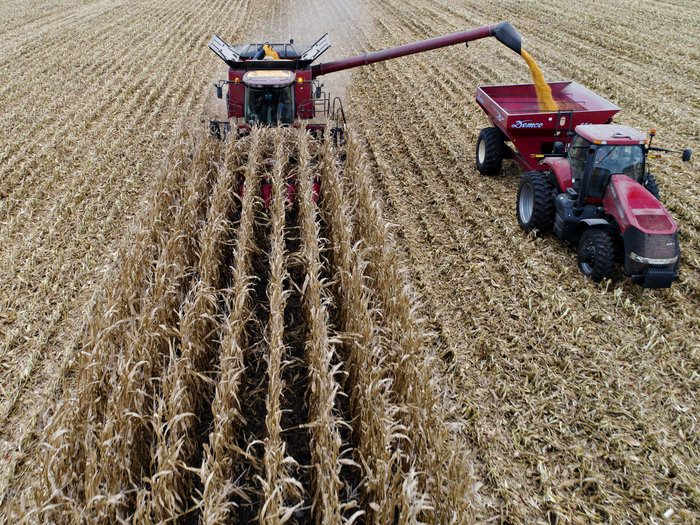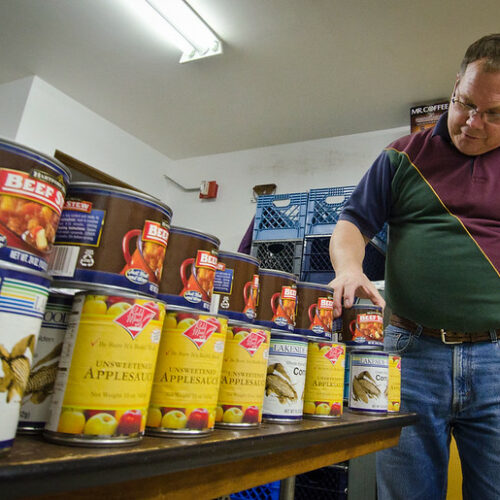
Farm Bill Compromise Reached With SNAP Changes Out, Industrial Hemp In
BY BRAKKTON BOOKER AND GRANT GERLOCK
Lawmakers unveiled the much-anticipated farm bill compromise Monday night, ending the months-long impasse over whether a critical piece of legislation that provides subsidies to farmers and helps needy Americans buy groceries could pass before the lame-duck session concludes at the end of the year.
The agreement was reached after a proposal — backed by House Republicans and President Trump — to add stricter work requirements for those who receive food stamps was taken off the table.
The behemoth piece of legislation will cost $867 billion over 10 years, according to House committee staffers.
Of course, it’s not law just yet.
The bill must still pass both the House and the Senate and be signed into law by the president, but that could come as early as this week.
While much of the farm bill compromise mirrors current law, there is a major change coming for farmers: Industrial hemp will be legalized. It’s a boon for the increasingly popular cannabidiol, or CBD oil, industry, which is being used for medicinal purposes.
Forestry was another sticking point that emerged in the final weeks of negotiations, with the White House weighing in on the California wildfires. It didn’t get exactly what it wanted, but specific thinning projects ranging from 3,000 acres to 4,500 acres of forest will be exempt from the public comment period.
As for conservation, the bill severely cuts funding for one of the three major programs that pays farmers to use environmentally friendly practices, like cover crops and field rotation. A different program will see more money, and there will be more land that farmers will be paid to fallow.
Changes to food stamps, or the Supplemental Nutrition Assistance Program, emerged as the biggest sticking point between the House and Senate bills and bogged down negotiations since the summer.
The House plan, which passed by the narrowest of margins and without single Democratic vote, called for those who receive the SNAP food subsidy to work more.
Because the stricter work requirements are gone from the final bill, House Democrats are largely poised to vote for its passage.
While the final compromise did preserve some portions of the House bill including some SNAP anti-fraud measures, the compromise bill is largely seen as a win for House Democrats and Senate negotiators.
The Senate’s version of the farm bill, which had no controversial changes to SNAP, passed 86-11. The final compromise bill is also expected to enjoy broad bipartisan support.
Lawmakers are hoping for swift passage this week so that it does not get swept into negotiations to keep the government funded beyond next Friday.
Keeping in spirit with the holiday season, Congress gifted itself a little breathing room by last week by punting on a fight over funding the government into late December. This came on the heels of tributes honoring former President George H.W. Bush at both the U.S. Capitol where he lay in state and at the memorial service at the Washington National Cathedral last week.
Bush died late last month at age 94.
Trump had repeatedly weighed in on negotiations saying he wanted stricter work rules in the final bill. Not having stricter work requirements is seen as a setback by conservatives who had made reducing federal safety net programs a top priority with Republicans controlling of both chambers of Congress and the White House.
The outcome of the midterm elections changed the negotiating leverage conservative holdouts had on the work requirement issue. If no deal was reached, the farm bill writing process would start anew under Democratic control of the House when the new Congress is seated in January.
According the Agriculture Department, more than 42 million Americans received SNAP benefits last year. The nutrition section of the farm bill, which includes SNAP, makes up about 80 percent of the farm bill’s expenditures.
The Trump administration has hinted at plans to limit states’ authority to temporarily suspend work requirements for some food stamp recipients. States can use the waivers citing areas of high unemployment or limited job availability.
Politico reported last week that Agriculture Secretary Sonny Perdue will introduce the proposed rule change after the farm bill passes.
Because the USDA proposal would be a change through regulation, it does not need to be approved by Congress.
Copyright 2018 National Public Radio
Related Stories:

Rural areas hit hard by food insecurity, study finds
Joe Tice, the Tukwila Pantry’s executive director, stocks tables with canned goods at the food bank in Tukwila, Washington. (Credit: Lance Cheung / USDA) Listen (Runtime 1:03) Read Before she

Funding for local poet laureate inspires international collaboration
At food establishments across Redmond, diners this month will find a unique accompaniment to their orders; poems.
Penned by local writers as well as poets from international Cities of Literature, the poems expound on community, harvest and lineage. Redmond’s poet laureate, Ching-In Chen, is leading the project, called Read Local Eat Local, It kicks off on Thursday Sept. 19 in conjunction with the Downtown Redmond Art Walk.

‘Tastes like hard work:’ Inside a foraging hike on the Kitsap Peninsula
Andrew Pogue, co-founder of Fair Isle Brewing in Seattle, reaches for fireweed leaves on a foraging trip. (Credit: Courtney Flatt / NWPB) Listen (Runtime 3:46) Read One craft brewery in















